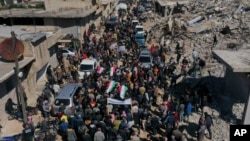Kurdish residents of a northwestern Syrian town have been protesting for three consecutive days following the killings of four civilians by members of a Turkish-backed armed group that controls the areas.
Locals in the town Jinderis in northwest Syria gathered on March 20 to celebrate the Kurdish New Year, known as Nowruz, but armed men affiliated with the so-called Syrian National Army (SNA) opened fire on them, killing four civilians and injuring at least two others, local media and rights groups reported.
According to the New York-based Human Rights Watch (HRW), the four victims belonged to the same family.
Jinderis is administratively part of the district of Afrin, which came under the control of Turkish military and Turkey-backed Syrian groups following a major military offensive against Kurdish forces in March 2018.
Many armed factions operating in the area are extremist groups, including some with ties to al-Qaida. International rights groups have accused such armed groups of carrying out violations against Kurdish locals in the region.
“These killings come after over five years of unaddressed human rights abuses at the hands of Turkish forces and the local Syrian factions they empower,” Adam Coogle, deputy Middle East director at HRW, said in a press release on Wednesday.
“Turkey has allowed these fighters to abuse people living in the areas under their control with impunity, risking making itself complicit in the violations,” he added.
The Turkish government has not publicly commented on the killings.
Observers say continued rights abuses in Afrin cannot be ignored anymore.
“The major protests that have continued since those killings on Nowruz eve show that nobody can cover for the grave violations that have been taking place by against the people of Afrin by various armed groups,” said Bahoz Khalil, a journalist from Afrin who currently lives in the Kurdish city of Qamishli in northeast Syria.
Khalil told VOA that while armed groups could still crack down on protesters, the demonstrations had succeeded in shedding light on an issue that was largely underreported in the past.
“Even media outlets affiliated with the Syrian opposition have begun covering the situation closely — something unheard of even just a week ago,” he said.
The ongoing protests against armed groups have attracted thousands of people from Jinderis and other areas of the Afrin district.
Ibrahim Sheikho, head of the Human Rights Committee of Afrin, said the killings have broken the barrier of fear among local Kurdish residents.
“The momentum is on the side of the people of Afrin, and even though the protests will likely end in a few days, the most important thing is that people are no longer afraid of speaking out against their oppressors,” he told VOA.
Jinderis was one of the areas hardest hit in the February 6 earthquake that killed thousands of people in northern Syria and southern Turkey.
Sheikho said the slow quake recovery response of local authorities, compounded with this week’s killings, compelled locals to take to the streets to express their grievances.
HRW has called to hold those responsible for the killings accountable “in a fair and transparent manner.”
SNA-affiliated factions said they have arrested three suspects who will face trials, but Sheikho said the local judicial system couldn’t be trusted.
“The presiding judge in this case is a member of the armed faction that was responsible for the killings, so it would most certainly be a sham trial,” he said.




